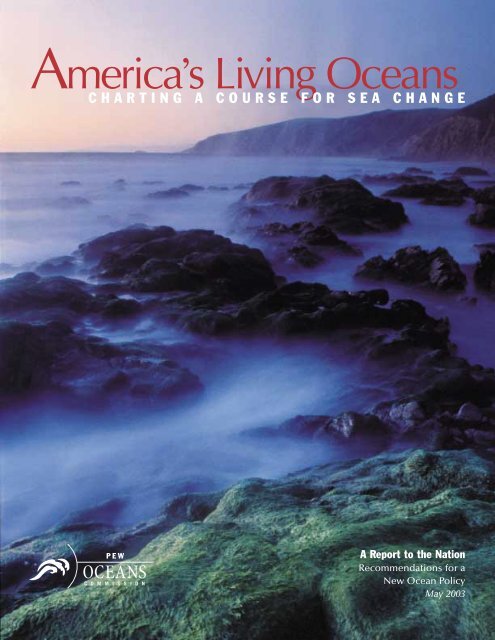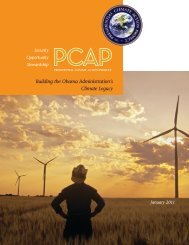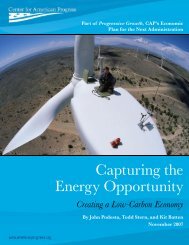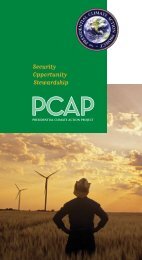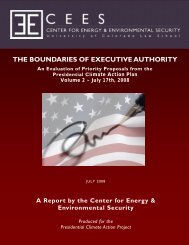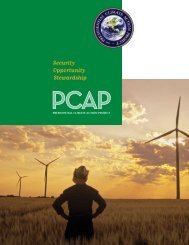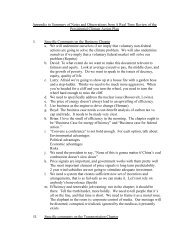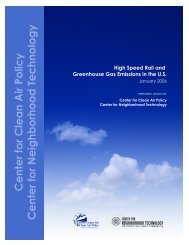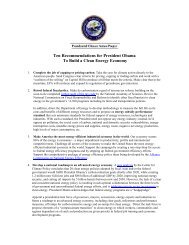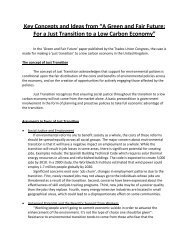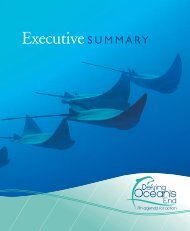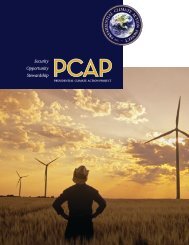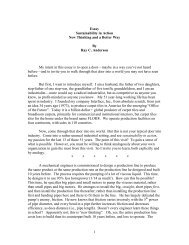540 PEW Final Report.qxd - Presidential Climate Action Project
540 PEW Final Report.qxd - Presidential Climate Action Project
540 PEW Final Report.qxd - Presidential Climate Action Project
Create successful ePaper yourself
Turn your PDF publications into a flip-book with our unique Google optimized e-Paper software.
America’s Living Oceans<br />
CHARTING A COURSE FOR SEA CHANGE<br />
C O M M I S S I O N<br />
A <strong>Report</strong> to the Nation<br />
Recommendations for a<br />
New Ocean Policy<br />
May 2003
FRONT AND BACK COVER<br />
Light of the setting sun bathes battered sea stacks shrouded by summer fog at<br />
McClure’s Beach, in Point Reyes National Seashore, California. Here, pounding<br />
Pacific waves have carved a shoreline of white crescent beaches and rocky cliffs.<br />
FOLDOUT MAP<br />
The United States’ oceans span nearly 4.5 million square miles, an area 23 percent<br />
larger than the land area of the nation.<br />
David Sanger/davidsanger.com
America’s Living Oceans<br />
CHARTING A COURSE FOR SEA CHANGE<br />
A <strong>Report</strong> to the Nation<br />
Recommendations for a<br />
New Ocean Policy<br />
May 2003<br />
Leon E. Panetta, Chair
Contents<br />
Sea otter with starfish, Central California coast<br />
Tom & Pat Leeson<br />
Foreword i<br />
Preface ii<br />
Members of the Pew Oceans Commission<br />
Executive Summary v<br />
iii<br />
PART ONE<br />
State of America’s Oceans<br />
Introduction: The Ocean Domain 2<br />
Chapter One: America Speaks 12<br />
Steve Simonsen/Marine Scenes<br />
Cushion sea star, Hurricane Hole,<br />
U.S. Virgin Islands<br />
© Chuck Davis/www.tidalflatsphoto.com<br />
California garibaldi in a kelp forest,<br />
Santa Catalina Island, California
PART TWO<br />
A Public Good at Risk<br />
Steve Simonsen/Marine Scenes<br />
Cushion sea stars, Virgin Islands<br />
National Park, U.S. Virgin Islands<br />
Chapter Two: Governance for Sustainable Seas 26<br />
Chapter Three: Restoring America’s Fisheries 35<br />
Chapter Four: Preserving Our Coasts 49<br />
Chapter Five: Cleaning Coastal Waters 59<br />
Chapter Six: Guiding Sustainable Marine Aquaculture 73<br />
Chapter Seven: Beyond Our Borders 80<br />
Chapter Eight: Science, Education, and Funding 88<br />
Chapter Nine: Conclusion: Charting a Course 97<br />
PART THREE<br />
Detailed Recommendations<br />
Chapter Ten: Governance for Sustainable Seas 102<br />
Chapter Eleven: Restoring America’s Fisheries 109<br />
Chapter Twelve: Preserving Our Coasts 117<br />
Chapter Thirteen: Cleaning Coastal Waters 121<br />
Chapter Fourteen: Guiding Sustainable Marine Aquaculture 126<br />
Works Cited 128<br />
Regional Meetings 134<br />
Publications of the Pew Oceans Commission 136<br />
Acknowledgements 137<br />
Index 138<br />
Pew Oceans Commission 144<br />
Publications of the Pew Oceans<br />
Commission on CD-ROM Inside Back Cover
Foreword<br />
Jeff Sedlik/Workbookstock.com<br />
Oregon Dunes National Recreation Area, Florence, Oregon<br />
© Dave Welling<br />
The oceans are a national trust<br />
we must preserve for this and<br />
future generations.<br />
At the heart of the American Dream is a desire to secure a better future for our children.<br />
That is what my grandfather sought as he sailed the oceans in great sailing ships and fished off<br />
California and Alaska. That is what my immigrant parents worked for when they moved their family from<br />
Italy to central California. And, that is the commitment my wife and I have made for our children.<br />
There can be no legacy without caring for those things most important to us. In our family, preserving<br />
the oceans’ beauty and bounty for future generations is an obligation to be honored.<br />
I grew up and live in Monterey, California—a community made famous by John Steinbeck’s<br />
Cannery Row—where boundless catches of sardines, bustling canneries, large fishing fleets of purse seiners,<br />
and busy wharves and shops served and supported fishermen and their families. When the sardine<br />
industry collapsed, the lives and businesses that depended on that seemingly endless resource also collapsed.<br />
My goal has been to end this kind of devastation, which threatens other fishing communities along<br />
our coasts. For 16 years, I represented coastal residents in Congress, fighting to protect the oceans and<br />
those whose livelihoods depend upon them. One of my proudest accomplishments is the creation of the<br />
Monterey Bay National Marine Sanctuary to restore, protect, and sustain the living resources so vital to the<br />
beauty and economy of this coast.<br />
Nearly three years ago, my love for the oceans brought me to the Pew Oceans Commission. I am<br />
joined in this effort by a distinguished group of individuals, each with a special connection to the oceans.<br />
They bring many lifetimes of leadership and accomplishment from the worlds of science, fishing, conservation,<br />
government, education, business, and philanthropy. They are bipartisan and independent, hailing<br />
from the North Atlantic to the South Pacific.<br />
Based on our careful review of the laws, policies, and institutions affecting life off our shores, we<br />
advocate a fundamental change in this nation’s posture toward its<br />
oceans. The recommendations presented here reflect the testimony<br />
of hundreds of individuals who joined us in public hearings and<br />
other gatherings across the country. We also solicited the best thinking<br />
of leading scientists and the firsthand experiences of fishermen,<br />
conservationists, and businesspeople.<br />
There is consensus that our oceans are in crisis and that<br />
reforms are essential. In the 1960s, the Stratton Commission<br />
reviewed U.S. ocean policy, found it lacking, and the nation<br />
responded. Much has changed in the ensuing years, and once again<br />
a commitment is needed to protect and preserve this national trust.<br />
A century ago, President Theodore Roosevelt committed the<br />
nation to the critical objective of preserving our land. Today, we<br />
have a similar responsibility to the seas that cover about 71 percent<br />
of our planet. These recommendations provide an opportunity and<br />
the means to meet our obligation and provide for our children a<br />
bountiful ocean legacy.<br />
Leon E. Panetta<br />
Chair, Pew Oceans Commission<br />
i
Preface<br />
DEEP WATER: AMERICA’S OCEANS IN TROUBLE<br />
Digital Vision<br />
Americans have always loved the ocean. Half of us live in coastal communities and the other half come to<br />
visit. Perhaps, as President John F. Kennedy once suggested, it is “the salt in our veins.”<br />
When we stand at the water’s edge, we stare longingly out to sea—for the boat to return, for the tides<br />
to shift, for the winds to arrive, for the fish to bite, for the sun to rise or set—beyond the far horizon.<br />
Inspired by their majesty and mystery, we depend on our oceans and their coasts, not just for pleasure<br />
and food—although these uses are central—but also as a counterweight to extremes of heat and cold on<br />
land, as a sponge for absorbing excess carbon, and as a generator of life-giving oxygen. Although we often<br />
view the ocean as starting where the land ends, that separation is arbitrary. Land and oceans are part of the<br />
same global system. Activities on one profoundly affect the other.<br />
Just as the 20 th century brought us into knowledgeable contact with outer space, the 21 st will almost<br />
certainly connect us more intimately to our oceans. In fact, it is imperative because—as much as we love our<br />
oceans—our ignorance has been destroying them. We love clean beaches, but what we discharge into the<br />
oceans befouls them. We destroy the very coastal wetlands we need to buffer storms and filter fresh water. A<br />
nation of seafood lovers, we are careless about how we treat the ocean’s “nurseries” and brood stocks that<br />
replenish our fish supply.<br />
Furthermore, the size of the world’s human population and the extent of our technological creativity have<br />
created enormously damaging impacts on all of the oceans. We are now capable of altering the ocean’s chemistry,<br />
stripping it of fish and the many other organisms which comprise its amazingly rich biodiversity, exploding<br />
and bleaching away its coral nurseries, and even reprogramming the ocean’s delicate background noise.<br />
We love our freedom to move about the ocean surface where no streets, signs, or fences impede us,<br />
yet our sense that no one owns this vast realm has allowed us to tolerate no one caring for it.<br />
During the 20 th century our nation has come to regard the air we breathe, the fresh water we drink,<br />
and the open lands as “common goods,” part of our public trust. Now we must acknowledge that the oceans,<br />
too, are part of our common heritage and our common responsibility.<br />
The report of the Pew Oceans Commission outlines a national agenda for protecting<br />
and restoring our oceans. It is a vision that projects an equilibrium of goods<br />
withdrawn from and goods regenerated within the ocean. It is a vision that abhors<br />
the careless—no less the systematic—extinction of vital sea species. It is a vision of<br />
clean water and clear horizons. Both comprehensive and detailed, the report presents<br />
a new direction for governing our oceans. From identifying the nonpoint pollutants<br />
that rush down our waterways into our coastal bays to proposing protected<br />
zones for critical marine life, the Commission has confronted the most challenging<br />
aspects of ocean policy. If its recommendations are accepted and acted upon, we<br />
can anticipate a future when fish will again be plentiful and fishing communities will<br />
thrive, when beaches will be clean again, and now-impoverished coral reefs will<br />
teem with life.<br />
We invite the American public to embrace this vision and to join with us to<br />
launch a national effort in behalf of future generations—to understand and protect our<br />
vast and bountiful, fragile and mysterious seas.<br />
David Rockefeller, Jr.<br />
Vice Chair, National Park Foundation<br />
Member, Pew Oceans Commission<br />
Steve Simonsen/Marine Scenes<br />
Pacific double-saddle butterfly<br />
fish, Western Shoals, Agana<br />
Harbor, Guam<br />
ii
Kenai Fjords National Park, Alaska<br />
Deb Antonini/Pew Oceans Commission<br />
Members<br />
OF THE <strong>PEW</strong> OCEANS COMMISSION<br />
The Honorable Leon E. Panetta, Chair<br />
He is director of the California State University Panetta Institute for<br />
Public Policy. He served in Congress for eight terms. He chaired the<br />
House Budget Committee and served as White House chief of staff.<br />
John H. Adams<br />
He is the founder and president of the Natural Resources Defense Council<br />
—one of the nation’s leading environmental organizations. In 1998,<br />
he was named one of Audubon’s 100 Champions of Conservation.<br />
The Honorable Eileen Claussen<br />
She is president of the Pew Center on Global <strong>Climate</strong> Change. She is a former assistant<br />
secretary of state for oceans, environment, and science.<br />
The Honorable Carlotta Leon Guerrero<br />
She is a former member of the Guam Senate where she chaired committees with jurisdiction<br />
over transportation, telecommunications, and Micronesian affairs. She is currently<br />
co-director of the Ayuda Foundation, a nonprofit health care organization in Guam.<br />
The Honorable Mike Hayden<br />
He is the secretary of the Kansas Department of Wildlife and Parks.<br />
The former governor of Kansas served as president and CEO<br />
of the American Sportfishing Association, a recreational fishing group.<br />
Geoffrey Heal, Ph.D.<br />
He is the Garrett Professor of Public Policy and Corporate Responsibility<br />
and professor of economics and finance at the Graduate School of<br />
Business at Columbia University. One of his major research interests is<br />
the interaction of human societies and their natural resources.<br />
Charles F. Kennel, Ph.D.<br />
He is director of the Scripps Institution for Oceanography and the author of<br />
more than 250 publications in plasma physics, planetary science,<br />
and astrophysics. He has been both a Fulbright and Guggenheim Scholar.<br />
The Honorable Tony Knowles<br />
He recently completed his second term as governor of Alaska. He was the<br />
mayor of Anchorage and served on the North Pacific Fishery Management<br />
Council, where he was instrumental in efforts to reduce bycatch.<br />
iii<br />
Jane Lubchenco, Ph.D.<br />
She is an Oregon State University professor of marine biology, a MacArthur Fellow, and<br />
past president of both the American Association for the Advancement of Science and the<br />
Ecological Society of America. She is president-elect of the International Council for<br />
Science, and recipient of the 2002 Heinz Award for the Environment.
Julie Packard<br />
She is the founder and executive director of the Monterey Bay Aquarium<br />
and vice chair of the David and Lucile Packard Foundation. She is the<br />
1998 recipient of the Audubon Medal for Conservation.<br />
The Honorable Pietro Parravano<br />
He is a commercial fisherman and owner of the Anne B. He is the<br />
president of the Pacific Coast Federation of Fishermen’s Associations and<br />
an elected member of the San Mateo County Harbor Commission.<br />
The Honorable George E. Pataki<br />
He is currently serving his second term as governor of New York.<br />
After graduating from Columbia Law School, he served ten years in the<br />
state legislature and was mayor of the city of Peekskill, his hometown.<br />
The Honorable Joseph P. Riley, Jr.<br />
He is serving his sixth term as mayor of Charleston, South Carolina. He has served<br />
as the president of the U.S. Conference of Mayors and has received many awards,<br />
including the Outstanding Mayors Award from the National Urban Coalition.<br />
David Rockefeller, Jr.<br />
He is director and former chair of Rockefeller Co., Inc., and is an active participant in<br />
the nonprofit fields of art, philanthropy, and the environment. He is a vice chair of the<br />
National Park Foundation and trustee of the Rockefeller Brothers Fund.<br />
Vice Admiral Roger T. Rufe, Jr., U.S. Coast Guard (Retired)<br />
He is the president and CEO of The Ocean Conservancy. While in the U.S.<br />
Coast Guard, he led offices responsible for marine conservation in Alaska<br />
and the Southeast U.S.<br />
Kathryn D. Sullivan, Ph.D.<br />
She is the president and CEO of COSI, a hands-on science center in Columbus, Ohio. As<br />
a NASA astronaut, she was the first U.S. woman to walk in space. She served as NOAA’s<br />
chief scientist from 1992 to 1996. She has a Ph.D. in geology.<br />
Marilyn Ware<br />
She is the chairman of the board of American Water Works Company, the nation’s<br />
largest private drinking water utility. She is a former newspaper editor and publisher,<br />
and currently serves on the board of the American Enterprise Institute.<br />
Patten (Pat) D. White<br />
He is a commercial fisherman and CEO of the Maine Lobstermen’s Association.<br />
He is a member of the Atlantic States Marine Fisheries Commission,<br />
and serves on the editorial board of National Fisherman.<br />
iv
Executive Summary<br />
Bocaccio, Channel Islands National Marine Sanctuary, California<br />
Richard Herrmann<br />
America’s oceans are in crisis and the stakes<br />
could not be higher. More than half the U.S.<br />
population lives in coastal counties. The resident<br />
population in this area is expected to<br />
increase by 25 million people by 2015. More<br />
than 180 million people visit the shore for<br />
recreation every year.<br />
Though a price tag has never been<br />
assigned to our coastal economy, it is clear<br />
that it contributes significantly to the nation’s<br />
overall economic activity. Tens of thousands of<br />
jobs in fishing, recreation, and tourism depend<br />
on healthy, functioning coastal ecosystems.<br />
Now, thousands of jobs and billions of dollars<br />
of investment have either been lost or are<br />
jeopardized by collapsing fisheries. Pollution<br />
and sprawl threaten ocean-related tourism and<br />
recreation, far and away the largest component<br />
of the coastal<br />
economy.<br />
But more than<br />
jobs are at stake. All<br />
Americans depend on<br />
the oceans and affect<br />
the oceans, regardless<br />
of where they live.<br />
Ocean currents circulate<br />
the energy and<br />
water that regulate the<br />
Earth’s climate and<br />
weather and, thus,<br />
affect every aspect of<br />
Fishing figures prominently in the<br />
the human experience.<br />
economies of many coastal communities, Our very dependence<br />
including Seward, Alaska, where anglers fish<br />
for salmon in Resurrection Bay.<br />
on and use of ocean<br />
Ron Niebrugge/wildnatureimages.com<br />
resources are exposing limits in natural systems<br />
once viewed as too vast and inexhaustible to<br />
be harmed by human activity. Without reform,<br />
our daily actions will increasingly jeopardize a<br />
valuable natural resource and an invaluable<br />
aspect of our national heritage.<br />
In the midst of crisis, there are expressions<br />
of hope and signs of success. Striped bass,<br />
severely depleted along our Atlantic shores,<br />
made a striking comeback when given a<br />
chance. North Atlantic swordfish recently did<br />
the same in response to lower catch limits and<br />
closed nursery areas. Seabirds, kelp beds, and<br />
fish communities returned to the coastal waters<br />
off Los Angeles after waste discharges were<br />
reduced. Proven, workable solutions to the crisis<br />
in our oceans exist but such successes will<br />
remain the exception rather than the rule until<br />
we chart a new course for ocean management.<br />
THE EVIDENCE<br />
The evidence that our oceans face a greater<br />
array of problems than ever before in our<br />
nation’s history surrounds us. Marine life and<br />
vital coastal habitats are straining under the<br />
increasing pressure of our use. We have reached<br />
a crossroads where the cumulative effect of<br />
what we take from, and put into, the ocean substantially<br />
reduces the ability of marine ecosystems<br />
to produce the economic and ecological<br />
goods and services that we desire and need.<br />
What we once considered inexhaustible<br />
and resilient is, in fact, finite and fragile.<br />
The crisis confronting our oceans has<br />
many dimensions.<br />
v
■ Coastal development and associated sprawl<br />
destroy and endanger coastal wetlands and<br />
estuaries that serve as nurseries for many<br />
valuable fishery species. More than 20,000<br />
acres of these sensitive habitats disappear<br />
each year. Paved surfaces have created<br />
expressways for oil, grease, and toxic pollutants<br />
into coastal waters. Every eight<br />
months, nearly 11 million gallons of oil run<br />
off our streets and driveways into our<br />
waters—the equivalent of the Exxon Valdez<br />
oil spill.<br />
■ More than 60 percent of our coastal rivers<br />
and bays are moderately to severely<br />
degraded by nutrient runoff. This runoff creates<br />
harmful algal blooms and leads to the<br />
degradation or loss of seagrass and kelp<br />
beds as well as coral reefs that are important<br />
spawning and nursery grounds for fish.<br />
Each summer, nutrient pollution creates a<br />
dead zone the size of Massachusetts in the<br />
Gulf of Mexico. These types of problems<br />
occur in almost every coastal state* and the<br />
trends are not favorable. If current practices<br />
continue, nitrogen inputs to U.S. coastal<br />
waters in 2030 may be as much as 30 percent<br />
higher than at present and more<br />
than twice what they were in 1960.<br />
■ Many ecologically and commercially crucial<br />
fish species, including groundfish and<br />
salmon populations along the Atlantic and<br />
Pacific Coasts, face overfishing and numerous<br />
other threats. Thirty percent of the fish<br />
populations that have been assessed are<br />
Nutrient pollution of coastal waters causes excessive<br />
algae growth on coral reefs, such as this one off<br />
Hawaii. Other major threats to reefs include climate<br />
change, overfishing, and sediment runoff resulting<br />
from development and agriculture.<br />
overfished or are being fished unsustainably.<br />
An increasing number of these species<br />
are being driven toward extinction. Already<br />
depleted sea turtle, marine mammal, seabird,<br />
and noncommercial fish populations<br />
are endangered by incidental capture in<br />
fishing gear. Destructive fishing practices<br />
are damaging vital habitat upon which fish<br />
and other living resources depend.<br />
Combined, these aspects of fishing are<br />
changing relationships among species in<br />
food webs and altering the functioning of<br />
marine ecosystems.<br />
■ Invasive species are establishing themselves<br />
in our coastal waters, often crowding<br />
out native species and altering habitat<br />
and food webs. More than 175 introduced<br />
species thrive in San Francisco Bay alone.<br />
Nearly one million Atlantic salmon<br />
escaped from farm pens on the western<br />
coast of North America in the last 15<br />
years. The species is now successfully<br />
© 2003 Norbert Wu/www.norbertwu.com<br />
*As used in this report, the terms “state” or “states” mean any or all of the fifty states, the District of Columbia, the<br />
Commonwealth of Puerto Rico, the Commonwealth of the Northern Mariana Islands, American Samoa, the Virgin<br />
Islands, Guam, and any other commonwealth, territory, or possession of the United States.<br />
vi
eproducing in British Columbia rivers and<br />
diluting the gene pool of native species by<br />
hybridizing with Pacific salmon. New<br />
species are regularly finding a home<br />
around our coastlines as hitchhikers in<br />
ship ballast water or on ship hulls,<br />
escapees from fish farms, and even as<br />
discarded home aquarium plants and animals.<br />
Of the 374 documented invasive<br />
species in U.S. waters, 150 have arrived<br />
since 1970.<br />
In addition to these varied threats, climate<br />
change over the next century is projected<br />
to profoundly impact coastal and marine<br />
ecosystems. Sea-level rise will gradually inundate<br />
highly productive coastal wetlands, estuaries,<br />
and mangrove forests. Coral reefs that<br />
harbor exceptional biodiversity will likely<br />
experience increased bleaching due to higher<br />
water temperatures. Changes in ocean and<br />
atmospheric circulation attributable to climate<br />
change could adversely affect coastal<br />
upwelling and productivity and have significant<br />
local, regional, and global implications<br />
on the distribution and abundance of living<br />
marine resources.<br />
These are just some of the signs that our<br />
interactions with the oceans are unsustainable.<br />
Our activities, from those that release<br />
pollutants into rivers and bays to the overfishing<br />
of the seas, are altering and threatening<br />
the structure and functioning of marine<br />
ecosystems—from which all marine life<br />
springs and upon which all living things,<br />
including humans, depend.<br />
SEEDS OF CRISIS<br />
The root cause of this crisis is a failure of<br />
both perspective and governance. We have<br />
failed to conceive of the oceans as our largest<br />
public domain, to be managed holistically for<br />
the greater public good in perpetuity. Our<br />
oceans span nearly 4.5 million square miles,*<br />
an area 23 percent larger than the nation’s<br />
land area. Similarly, we have only begun to<br />
recognize how vital our oceans and coasts<br />
are to our economy as well as to the cultural<br />
heritage of our nation. <strong>Final</strong>ly, we have come<br />
too slowly to recognize the interdependence<br />
of land and sea and how easily activities far<br />
inland can disrupt the many benefits provided<br />
by coastal ecosystems.<br />
The foundation of U.S. ocean policy was<br />
laid in a very different context than exists<br />
today. The principal laws to protect our<br />
coastal zones, endangered marine mammals,<br />
ocean waters, and fisheries were enacted 30<br />
years ago, on a crisis-by-crisis, sector-by-sector<br />
basis. Much of what exists of an ocean<br />
governance system in this country can be<br />
traced to recommendations of the Stratton<br />
Commission—the nation’s first review of<br />
ocean policy in 1969. Driven by the need to<br />
ensure the “full and wise use of the marine<br />
environment,” Stratton focused on oceans as a<br />
frontier with vast resources, and largely rec-<br />
*This is the approximate area (in square statute miles) of the United States Exclusive Economic Zone (EEZ)—the area of<br />
the oceans over which the United States exercises exclusive environmental and economic jurisdiction. The U.S. EEZ was<br />
established by <strong>Presidential</strong> Proclamation in 1983. The establishment of an EEZ extending 200 nautical miles from the shoreline<br />
of a coastal nation is recognized and accepted under the United Nations Convention on the Law of the Sea.<br />
vii
Deb Antonini/Pew Oceans Commission<br />
Commissioners tour a cannery in Kodiak, Alaska, home port for more than 700 trawl, longline, and crab vessels.<br />
ommended policies to coordinate the development<br />
of ocean resources.<br />
Reflecting the understanding and values<br />
of this earlier era, we have continued to<br />
approach our oceans with a frontier mentality.<br />
The result is a hodgepodge of ocean laws<br />
and programs that do not provide unified,<br />
clearly stated goals and measurable objectives.<br />
Authority over marine resources is fragmented<br />
geographically and institutionally.<br />
Principles of ecosystem health and integrity,<br />
sustainability, and precaution have been lost<br />
in the fray. Furthermore, the nation has substantially<br />
underinvested in understanding and<br />
managing our oceans. The information we do<br />
have in hand is often underutilized. Plagued<br />
with systemic problems, U.S. ocean governance<br />
is in disarray.<br />
A 30-YEAR REVIEW OF OCEAN POLICY<br />
More than 30 years after the Stratton<br />
Commission issued its recommendations, the<br />
state of our oceans and coasts is vastly<br />
altered. Although some of the problems that<br />
were considered 30 years ago remain with us<br />
today, new environmental, economic, and<br />
policy challenges have emerged. These challenges<br />
exceed the capacity of today’s governance<br />
framework and management regimes.<br />
Our perspective on ocean resources and<br />
policy has also changed over 30 years. We are<br />
increasingly aware that development activities<br />
can change marine environments. We are<br />
learning more about complex interactions in<br />
marine ecosystems and the need to maintain<br />
the diversity and resilience of those complex<br />
and adaptive natural systems. Today, there is a<br />
viii
clear sense that we must do a better job of<br />
protecting the oceans if we hope to continue<br />
to enjoy their benefits.<br />
The Pew Oceans Commission, a bipartisan,<br />
independent group of American leaders,<br />
was created to chart a new course for the<br />
nation’s ocean policy. Our mission is to identify<br />
policies and practices necessary to restore<br />
and protect living marine resources in U.S.<br />
waters and the ocean<br />
and coastal habitats<br />
on which they<br />
depend. The<br />
Commission was also<br />
charged with raising<br />
public awareness of<br />
the principal threats to<br />
marine biodiversity<br />
Senator Ernest Hollings (D-SC) welcomes<br />
Leon Panetta, Dana Beach of the South and of the importance<br />
Carolina Coastal Conservation<br />
of ocean and coastal<br />
League, and Deb Antonini of the Pew<br />
Oceans Commission at the release of Mr. resources to the U.S.<br />
Beach's report on coastal sprawl.<br />
economy.<br />
The Commission brought together a<br />
diverse group of American leaders from the<br />
worlds of science, fishing, conservation, government,<br />
education, business, and philanthropy.<br />
It secured the help of leading scientists to<br />
determine priority issues and to write reports<br />
summarizing the best scientific information<br />
available on those subjects (see list of publications<br />
on page 136). The Commission organized<br />
into four committees to review the core issues<br />
of governance, fishing, pollution, and coastal<br />
development. It also investigated marine aquaculture,<br />
invasive species, ocean zoning, climate<br />
change, science, and education.<br />
Chris Mann/Pew Oceans Commission<br />
For more than two years, the Commission<br />
conducted a national dialogue on ocean issues.<br />
We convened a series of 15 regional meetings,<br />
public hearings, and workshops to listen to<br />
those who live and work along the coasts. From<br />
Maine to Hawaii, Alaska to the Gulf of Mexico,<br />
we spoke with hundreds of citizens, fishermen,<br />
scientists, government officials, tourism operators,<br />
and business leaders. Commissioners held<br />
a series of 12 focus groups with fishermen,<br />
including one in Kodiak, Alaska, which is<br />
among the nation’s oldest and largest fishing<br />
communities. Believing that experience is the<br />
best teacher, Commissioners went lobster fishing<br />
in Maine, toured a pineapple plantation in<br />
Hawaii to learn about ways to control polluted<br />
runoff, and visited coastal habitat restoration<br />
projects in New York and South Carolina.<br />
By speaking with those who live and<br />
work along the coasts and around the country,<br />
and by collecting the best scientific information<br />
available, the Commission learned a great<br />
deal about the problems facing our oceans,<br />
the consequences to coastal communities and<br />
the nation if we fail to act, and actions needed<br />
to overcome the crisis facing our oceans. The<br />
status quo is unacceptable. Future generations<br />
will judge this generation on whether it shoulders<br />
its responsibility.<br />
CONCLUSIONS AND RECOMMENDATIONS<br />
The fundamental conclusion of the Pew<br />
Oceans Commission is that this nation needs<br />
to ensure healthy, productive, and resilient<br />
marine ecosystems for present and future generations.<br />
In the long term, economic sustain-<br />
ix
ability depends on ecological sustainability.<br />
To achieve and maintain healthy ecosystems<br />
requires that we change our perspective<br />
and extend an ethic of stewardship and<br />
responsibility toward the oceans. Most importantly,<br />
we must treat our oceans as a public<br />
trust. The oceans are a vast public domain that<br />
is vitally important to our environmental and<br />
economic security as a nation. The public has<br />
entrusted the government with the stewardship<br />
of our oceans, and the government should<br />
exercise its authority with a broad sense<br />
of responsibility toward all citizens and their<br />
long-term interests.<br />
These changes in our perspective must<br />
be reflected in a reformed U.S. ocean policy.<br />
National ocean policy and governance must<br />
be realigned to reflect and apply principles of<br />
ecosystem health and integrity, sustainability,<br />
and precaution. We must redefine our relationship<br />
with the ocean to reflect an understanding<br />
of the land-sea connection and<br />
organize institutions and forums capable of<br />
managing on an ecosystem basis. These<br />
forums must be accessible, inclusive, and<br />
accountable. Decisions should be founded<br />
upon the best available science and flow from<br />
processes that are equitable, transparent, and<br />
collaborative.<br />
To embrace these reforms and achieve<br />
our goal, the nation must realize five priority<br />
objectives:<br />
1. Declare a principled, unified national<br />
ocean policy based on protecting ecosystem<br />
health and requiring sustainable use of<br />
ocean resources.<br />
2. Encourage comprehensive and coordinated<br />
governance of ocean resources and uses at<br />
scales appropriate to the problems to be<br />
solved.<br />
a. The regional scale of large marine ecosystems<br />
is most appropriate for fisheries management<br />
and for governance generally.<br />
b. Coastal development and pollution control<br />
is most appropriately addressed at<br />
the watershed level.<br />
3. Restructure fishery management institutions<br />
and reorient fisheries policy to protect and<br />
sustain the ecosystems on which our fisheries<br />
depend.<br />
4. Protect important habitat and manage<br />
coastal development to minimize habitat<br />
damage and water quality impairment.<br />
5. Control sources of pollution, particularly<br />
nutrients, that are harming marine<br />
ecosystems.<br />
The Commission recommends the following<br />
actions to achieve these objectives.<br />
Governance for Sustainable Seas<br />
1. Enact a National Ocean Policy Act to protect,<br />
maintain, and restore the health, integrity,<br />
resilience, and productivity of our oceans.<br />
2. Establish regional ocean ecosystem councils<br />
to develop and implement enforceable<br />
regional ocean governance plans.<br />
3. Establish a national system of fully protected<br />
marine reserves.<br />
4. Establish an independent national<br />
oceans agency.<br />
x
5. Establish a permanent federal interagency<br />
oceans council.<br />
Restoring America’s Fisheries<br />
1. Redefine the principal objective of<br />
American marine fishery policy to protect<br />
marine ecosystems.<br />
2. Separate conservation and allocation decisions.<br />
3. Implement ecosystem-based planning and<br />
marine zoning.<br />
4. Regulate the use of fishing gear that is<br />
destructive to marine habitats.<br />
5. Require bycatch monitoring and management<br />
plans as a condition of fishing.<br />
6. Require comprehensive access and allocation<br />
planning as a condition of fishing.<br />
7. Establish a permanent fishery conservation<br />
and management trust fund.<br />
Preserving Our Coasts<br />
1. Develop an action plan to address nonpoint<br />
source pollution and protect water<br />
quality on a watershed basis.<br />
2. Identify and protect from development<br />
habitat critical for the functioning of<br />
coastal ecosystems.<br />
3. Institute effective mechanisms at all levels<br />
of government to manage development and<br />
minimize its impact on coastal ecosystems.<br />
4. Redirect government programs and subsidies<br />
away from harmful coastal development<br />
and toward beneficial activities,<br />
including restoration.<br />
Cleaning Coastal Waters<br />
1. Revise, strengthen, and expand pollution<br />
laws to focus on nonpoint source pollution.<br />
2. Address unabated point sources of pollution,<br />
such as concentrated animal feeding<br />
operations and cruise ships.<br />
3. Create a flexible framework to address<br />
emerging and nontraditional sources<br />
of pollution, such as invasive species<br />
and noise.<br />
4. Strengthen control over toxic pollution.<br />
Guiding Sustainable Marine Aquaculture<br />
1. Implement a new national marine aquaculture<br />
policy based on sound conservation<br />
principles and standards.<br />
2. Set a standard, and provide international<br />
leadership, for ecologically sound marine<br />
aquaculture practices.<br />
Science, Education, and Funding<br />
1. Develop and implement a comprehensive<br />
national ocean research and monitoring<br />
strategy.<br />
2. Double funding for basic ocean science<br />
and research.<br />
3. Improve the use of existing scientific information<br />
by creating a mechanism or institution<br />
that regularly provides independent<br />
scientific oversight of ocean and coastal<br />
management.<br />
4. Broaden ocean education and awareness<br />
through a commitment to teach and learn<br />
about our oceans, at all levels of society.<br />
This nation must decide how it will<br />
choose to meet the crisis in our oceans.<br />
Fundamentally, this is not a decision about us.<br />
It is about our children, and actions we must<br />
take to bequeath them thriving oceans and<br />
healthy coastlines.<br />
xi
This is our challenge. To meet this challenge,<br />
the nation must substantially increase<br />
its investment in understanding and managing<br />
its oceans. We need a much greater financial<br />
commitment to strengthen governance and<br />
management infrastructure, to improve our<br />
scientific understanding of marine ecosystems<br />
and human impacts, and to educate all<br />
Americans about the oceans.<br />
If properly executed, this investment<br />
will be paid back manyfold in the form of<br />
abundant living ocean resources for centuries<br />
ahead. Without this investment, we risk further<br />
decline in ocean ecosystem health and serious<br />
consequences for human well-being far into<br />
the future.<br />
Justin Kenney/Pew Oceans Commission<br />
Commissioner Carlotta Leon Guerrero (above) joined Hawaiian schoolchildren for a taping of KidScience, produced<br />
jointly by the Hawaii Department of Education and Hawaii Public Television, during the Commission’s visit to Hawaii in<br />
February 2001.<br />
xii


